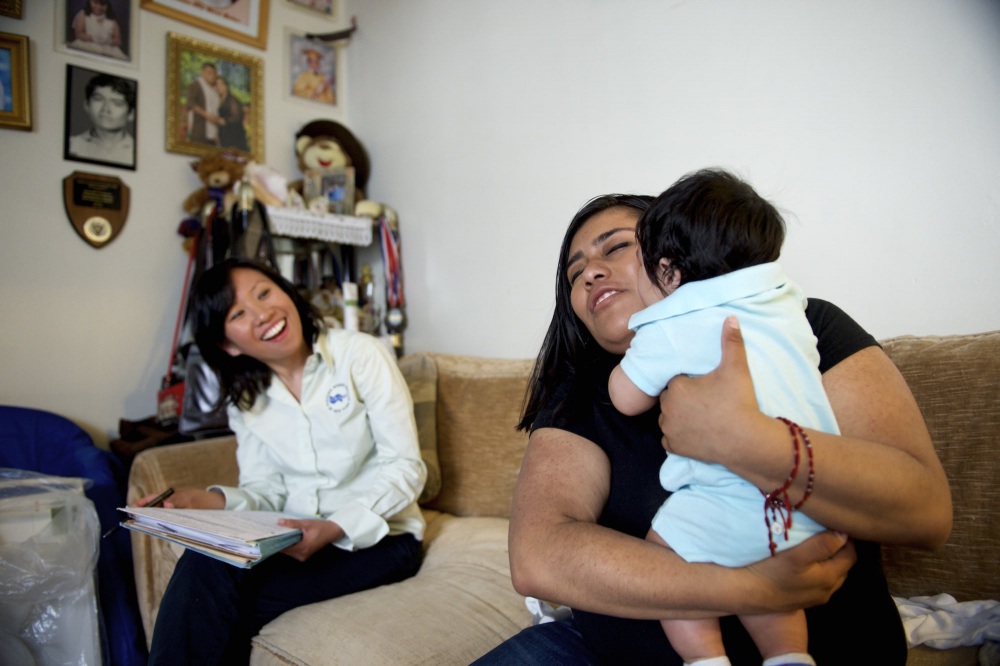

Public Sector Solutions, Children & Families, Health, Results-Based Funding
Key Takeaway
The South Carolina Nurse-Family Partnership Social Impact Bond mobilized $29 million to expand NFP services to more than 3,000 first-time mothers with low incomes statewide. This enabled NFP to increase service delivery capacity by 40% and expand their geographic footprint to serve mothers in nearly 70% of the counties across the state.
40%
Increase in service delivery capacity
More than half of the children born in South Carolina in 2015 were born to mothers living in poverty. Understanding the well-documented impact of poverty on childhood development and long-term family outcomes, the state’s Department of Health and Human Services (SCDHHS) turned to a novel public-private financing tool, the Social Impact Bond.
SCDHHS leveraged the Social Impact Bond to expand access to an evidence-based, home-visiting model called Nurse-Family Partnership (NFP) that pairs specially trained nurses with mothers living in poverty to strengthen families and improve child and maternal health outcomes. Families receiving NFP get access to a free personal nurse that provides support, advice, and information during pregnancy and after birth.
To read an example of how NFP supports mothers, read:
A story of impact: Nurse-Family Partnership supports mom Terri and her daughter Aubrielle →
The South Carolina Nurse-Family Partnership Pay for Success project, launched in 2016, was among the earliest U.S. Social Impact Bonds and was the first initiative of this kind focused on maternal and child health. Social Finance and the Harvard Kennedy School’s Government Performance Lab worked closely with South Carolina, the National Service Office for Nurse-Family Partnership and Child First (National Service Office), and a group of philanthropies to design and develop the project.
The first child and maternal health Social Impact Bond
In keeping with the aspirations of the Social Impact Bond, scale and outcomes accountability were two of the main forces driving the initiative. The project mobilized $29 million to expand NFP services to more than 3,000 first-time mothers with low incomes statewide. This growth capital enabled NFP to increase service delivery capacity by 40% and expand their geographic footprint to serve mothers in nearly 70% of the counties across South Carolina.
SCDHHS also used the Social Impact Bond to bring an added level of accountability for results. The agency committed to paying up to $7.5 million in outcome payments if positive results were achieved on a subset of NFP outcomes, including reduced preterm births, improved healthy birth spacing, reduced child hospitalization and emergency room visits, and an increase in the number of mothers served in predetermined zip codes with high concentrations of poverty.
Like other Social Impact Bonds, the project also included unique design elements to align the financing tool with local objectives. With the goal of building a bridge to financial sustainability, this project was the first to partner with the Centers for Medicare and Medicaid Services to acquire a 1915(b) Medicaid Waiver that funded approximately $12 million of the service delivery cost. The Medicaid funding was braided with $17 million in private investments from philanthropic funders. And to further support sustainability goals, the philanthropic funders committed to reinvest 100% of SCDHHS’ outcome payments back into NFP services in South Carolina.
The project also presented an opportunity to rigorously test, via a randomized control trial (RCT), NFP’s ability to achieve outcomes while scaling capacity, and after implementing innovations to improve service delivery and lower cost. NFP tested several programmatic enhancements, including telehealth visits, which proved immensely valuable during the Coronavirus pandemic, and a new assessment framework that allows nurses to better understand the strengths and risks associated with the mothers and families they serve. The National Service Office is now implementing both NFP innovations across the country.
The service innovation mindset also fostered a stronger working relationship between the SCDHHS and NFP. For example, South Carolina established a new process to share Medicaid referrals directly with NFP, which was a huge boon to the project’s scale objectives, as Medicaid accounted for nearly 40% of all the referrals to the program.
Interim project assessment
The project concluded April 1, 2021, with J-Pal North America (J-PAL), the project’s independent evaluator, publishing an interim evaluation report indicating that NFP did not have an impact on the four preselected Pay for Success outcomes. The interim results for the three outcomes, preterm births, healthy birth spacing, and child injury, measured by RCT only captured outcomes for a subset of the enrolled clients and were not statistically significant, meaning there was no distinguishable difference between the results for the families that received NFP and those who did not. This does not mean, however, that the project had no impact on the mothers and children that were served.
A more comprehensive assessment of NFP’s impact will emerge through J-PAL’s longer-term evaluation, which will continue for 30 years (learn more on the study’s website). J-PAL will publish a series of findings assessing the long-term impact of NFP on South Carolina families across a wide range of health and wellbeing outcomes. NFP remains committed to serving mothers and children in need of home visiting services.
As one of the largest Social Impact Bonds in the country—and the first focused on maternal and child health—the project was a valuable test case for the nascent Pay for Success movement. This project, like many of the other early Social Impact Bonds, has provided important insights for governments and the broader social services sector. For governments, the project highlighted opportunities to braid and leverage different sources of capital, the value of linking performance to the provision of services, and the importance of building strong working partnerships with service providers.
For the social service sector, Social Impact Bonds have provided constructive insights on the conditions needed to scale evidence-based programs and the challenges of defining program success through a limited set of outcome metrics. These insights have already shaped the trajectory of the Pay for Success field and the space will continue to evolve as more learnings are aggregated from soon-to-be-completed Social Impact Bonds.
As practitioners in the space, we are committed to aggregating and sharing Social Impact Bond learnings and challenges to inform the broader Pay for Success field. We look forward to sharing our insights and reflections on this and other Social Impact Bonds in the coming months.
We’d like to thank South Carolina’s Department of Health and Humans Services, the National Service Office for Nurse-Family Partnership and Child First, Children’s Trust of South Carolina, J-PAL North America, The Duke Endowment, Blue Meridian Partners, BlueCross BlueShield of South Carolina Foundation, Greenville County First Steps, The Boeing Company, and Arnold Ventures for their deep engagement and collaboration on this project.
Photo courtesy of Nurse-Family Partnership.
Related Insight

Improving Outcomes for Children and Families through Pay for Success
The passage of the Results Act marks a starting point—the source of new opportunities for state and local governments to direct funding toward effective interventions and leverage federal funding to pay for positive outcomes.

A Story of Impact: Nurse-Family Partnership Supports Mom Terri and Daughter Aubrielle
Terri met Karen when she enrolled in the Nurse-Family Partnership (NFP) at McLeod Health in Florence, South Carolina. NFP, the state of South Carolina, and Social Finance launched the Pay for Success program in February…